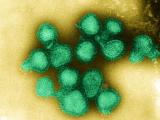Jul 26, 2012
Vaccines for swine-origin H3N2 flu strain to be tested this year
Vaccines for the swine-origin H3N2 influenza variant (H3N2v) identified in 17 human cases in the past year will be tested in clinical trials this year, a US Department of Health and Human Services (HHS) official told CIDRAP News today. Sanofi Pasteur and Novartis have made vaccines for the strain using, respectively, egg-based and cell-based technologies, said Gretchen Michael, director of communications for the HHS Office of the Assistant Secretary for Preparedness and Response. She said the companies have prepared enough of each vaccine for clinical trials, and the National Institutes of Health's Vaccine and Therapeutics Evaluation Unit will conduct the trials this year. Meanwhile, the Centers for Disease Control and Prevention (CDC) today released a short report on the four latest H3N2v cases, which were first reported Jul 24 by the Indiana State Department of Health. The cases involved four people who showed swine or were family members of swine exhibitors at the LaPorte County Fair in Indiana, where 12 pigs also tested positive for the virus. In the Jul 27 Morbidity and Mortality Weekly Report (MMWR), the CDC said a preliminary genetic analysis has shown "a very high level of similarity" between the human and swine viruses. The report notes that only limited human-to-human transmission of H3N2v has been seen in outbreaks so far, but the viruses "could change to transmit efficiently among humans." Also today, the CDC posted a "Have You Heard?" update on the cases. In it Daniel Jernigan, MD, MPH, influenza deputy director at CDC, said that 11 of the 17 H3N2v cases were associated with swine contact. The notice also notes precautions for those attending fairs, such as frequent hand washing.
Jul 27 MMWR article
Jul 25 CIDRAP News story on Indiana cases
Study finds flu vaccine effectiveness 60% when strains matched well
Flu vaccine effectiveness during the 2010-11 season—when all three vaccine strains circulated—was 60%, according to a study yesterday by US researchers. The case-control study in Clinical Infectious Diseases involved 1,040 influenza cases fairly evenly divided among pandemic 2009 H1N1, H3N2, and influenza B, as well as 3,717 flu-negative case controls. Flu status was determined by real-time reverse-transcription polymerase chain reaction. The team found an overall adjusted vaccine effectiveness (VE) of 60% (95% confidence interval [CI], 53%-66%), with age-related VE varying from 69% (95% CI, 56%-77%) in children 6 months to 8 years old to 38% (95% CI, −16% to 67%) in those 65 and older. They note that the circulating strains were antigenically similar to the vaccine strains.
Jul 25 Clin Infect Dis abstract




















